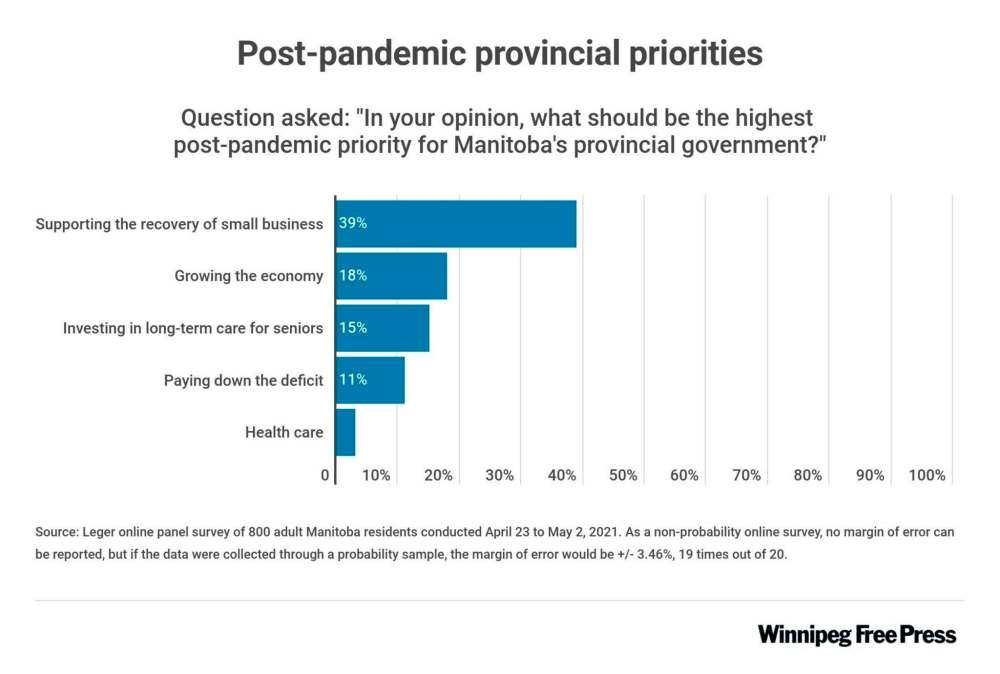Public support of small business outstrips government concern
Read this article for free:
or
Already have an account? Log in here »
To continue reading, please subscribe:
Monthly Digital Subscription
$0 for the first 4 weeks*
- Enjoy unlimited reading on winnipegfreepress.com
- Read the E-Edition, our digital replica newspaper
- Access News Break, our award-winning app
- Play interactive puzzles
*No charge for 4 weeks then price increases to the regular rate of $19.00 plus GST every four weeks. Offer available to new and qualified returning subscribers only. Cancel any time.
Monthly Digital Subscription
$4.75/week*
- Enjoy unlimited reading on winnipegfreepress.com
- Read the E-Edition, our digital replica newspaper
- Access News Break, our award-winning app
- Play interactive puzzles
*Billed as $19 plus GST every four weeks. Cancel any time.
To continue reading, please subscribe:
Add Free Press access to your Brandon Sun subscription for only an additional
$1 for the first 4 weeks*
*Your next subscription payment will increase by $1.00 and you will be charged $16.99 plus GST for four weeks. After four weeks, your payment will increase to $23.99 plus GST every four weeks.
Read unlimited articles for free today:
or
Already have an account? Log in here »
Hey there, time traveller!
This article was published 06/05/2021 (1680 days ago), so information in it may no longer be current.
There’s a reason why government support for small business is the top priority among Manitobans in a new Leger/Free Press poll: small- and medium-sized operators have born the economic brunt of the COVID-19 pandemic.
Almost everyone seems to recognize that — except the Manitoba government, which has tried since the beginning of the pandemic to provide affected businesses with as little support as possible.
The survey, conducted April 23-May 2, asked respondents to prioritize where the province should turn its attention once the pandemic is over. The No. 1 answer was: “Supporting the recovery of small business, such as the restaurant and hospitality, and tourism sectors.”
At 39 per cent, it was well ahead of all other choices, including “growing the economy” at 18 per cent, and “investing in long-term care for seniors” at 15 per cent.
There’s no question public-facing businesses, especially smaller operators, have made the biggest economic sacrifices. They’ve been forced to shut their doors for extended periods of time, or severely curtail operations.
Some of have gone bankrupt, many are on the brink of insolvency. Others are heavily in debt and may take years to recover. Some will never recover.
That’s not the case for most other sectors of the economy, including big industry, trades and construction. They weren’t shut down; whatever sacrifices they made pale in comparison.
Small- and medium-sized businesses, particularly in hospitality and retail, have paid a disproportionate price. Despite that, they have not received fair compensation.
The public appears to recognize that.
Premier Brian Pallister doesn’t.
“It isn’t small-business people alone that are suffering, it’s a heck of a lot of other people, too. I’ll tell you what: we’re not going to reopen all the small businesses just because somebody’s yelling about it.” — Premier Brain Pallister
He made that pretty clear in December, when many small businesses were shut down a second time. When asked what his message was to small operators who had to bear the economic brunt of public health restrictions, the premier lectured them about the pain all Manitobans were feeling.
“It isn’t small-business people alone that are suffering, it’s a heck of a lot of other people, too,” he said. “I’ll tell you what: we’re not going to reopen all the small businesses just because somebody’s yelling about it.”
Pallister takes more of a survival-of-the-fittest approach. Government forced small enterprise to shut down (or limit operations) for the greater good of society, but it’s now up to them to figure out how to get back on their feet.
The province has provided businesses with some limited financial aid, including the $15,000 Bridge Grant (which is now closed). The grant amount is a pittance for those facing losses in the hundreds of thousands of dollars.
When pressed, Pallister has said the province’s pockets aren’t deep enough to compensate small business beyond that. Meanwhile, the government plans to borrow $302 million to accelerate an education property tax cut plan over the next two years — money that will have to be repaid by future generations (with interest).
Manitoba is not alone. All governments in Canada are guilty of failing to adequately support small business during the pandemic.
Most of Ottawa’s aid was geared toward big business, or was so convoluted and complex (such as the disastrous rent subsidy program, which took the federal Liberals months to straighten out) many small operators couldn’t access it.
Wage subsidies do nothing for businesses forced to shut their doors.
The Canadian Federation of Independent Business released an analysis Thursday of how provincial programs have failed to adequately compensate small businesses. Many didn’t qualify for aid at all, even though they were adversely affected by public health orders.
What the Leger survey shows is many Manitobans recognize the inherent unfairness of shutting down small businesses and failing to adequately compensate them.
The provincial government should take its cue from the public on this one.
tom.brodbeck@freepress.mb.ca

Tom has been covering Manitoba politics since the early 1990s and joined the Winnipeg Free Press news team in 2019.
Our newsroom depends on a growing audience of readers to power our journalism. If you are not a paid reader, please consider becoming a subscriber.
Our newsroom depends on its audience of readers to power our journalism. Thank you for your support.










